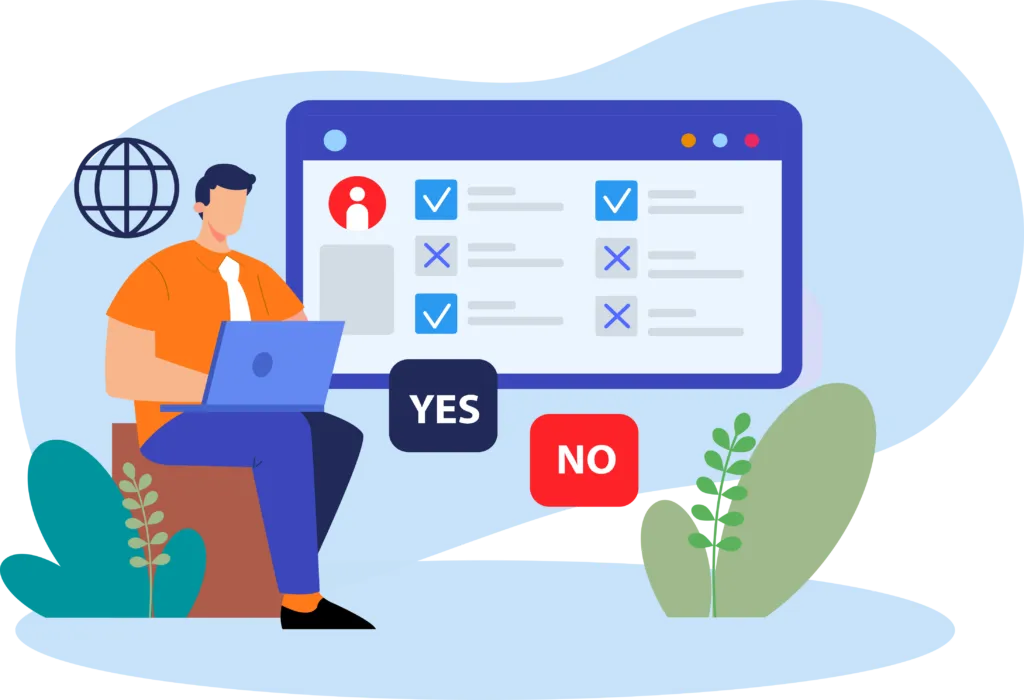
TEST USER KNOWLENDGE WITH
ONLINE QUIZZES
Ensure your workers understand your organization’s safety policeis and procedures by running quizzes.
RANDOMISE
QUESTIONS
Ensure each participant receives a unique quiz version, reducing the chances of answer sharing. It encourages genuine understanding, promotes active learning and maintains the integrity of the assessment process.


HELP THEM FIND
CORRECT ANSWERS
Allow users to try answering questions multiple times until they get them right or set a minimum passing score to meet your requirements.
This method supports better learning outcomes by reinforcing understanding and helping users retain essential safety and compliance knowledge more effectively.
RELATED FEATURES
Send inductees invitations via SMS. This provides a layer of authentication so you know the person being inducted is the person that should be inducted!
You can instantly connect your IFW account with more than 7,500+ apps, including Dropbox, Google Drive, Job Progress, Pro Core, Xero, Quick Books and many more.
Automatically translate both audio and text. We use advanced artificial intelligence to automatically translate inductions into 55+ languages.
What are the Benefits of Using Quizzes in Induction Training?
Induction training plays a vital role in ensuring that new employees are properly introduced to a company’s culture, safety procedures, policies and expectations. To enhance the effectiveness of this training, many companies are now integrating quizzes into the induction process. These quizzes are more than just a formality — they offer a wide range of benefits for both workers and organisations.
Reinforcing Key Information
One of the main advantages of including quizzes in induction training is their ability to reinforce critical information. When employees are asked to recall and apply what they’ve learned in a quiz format, they’re more likely to retain that information. This is especially important when the content involves workplace safety, company procedures or compliance requirements. A well-designed quiz helps cement this knowledge in the minds of workers.
Encouraging Active Participation
Quizzes encourage active engagement from participants. Instead of passively reading through induction material or watching a video, employees are prompted to think critically about what they’ve just learned. This kind of interaction boosts understanding and reduces the risk of important details being overlooked.
Identifying Knowledge Gaps
From a company’s perspective, quizzes are an excellent tool for identifying knowledge gaps early on. If a new employee consistently gets questions wrong in a specific area — for example, safe lifting procedures or emergency exits — that signals a need for additional support or clarification. This insight allows managers to offer timely interventions, reducing the chance of errors or accidents later.
Standardising the Induction Experience
Using quizzes helps to standardise the induction process across all departments and locations. This ensures that every worker, regardless of role or site, receives and understands the same key information. This consistency supports compliance with internal policies and external regulations and helps protect the company from legal liability.
Demonstrating Compliance and Due Diligence
Quizzes also serve as a formal record of understanding. When employees complete quizzes and achieve a passing score, it shows that the company has taken reasonable steps to train and inform its workforce. In the event of a workplace incident or audit, these records can be used as evidence that proper induction and compliance measures were followed.
Boosting Confidence
For new workers, being tested on training content can help build confidence. Passing a quiz reassures them that they’ve understood what’s expected and are prepared to do their job safely and effectively. This can ease nerves, particularly in high-risk or highly regulated industries, and lead to smoother transitions into new roles.
Continuous Improvement
Finally, quizzes provide data that companies can use to improve future training. If many inductees struggle with a particular question or topic, that may indicate unclear training material. Companies can adjust the content to ensure better comprehension moving forward.
